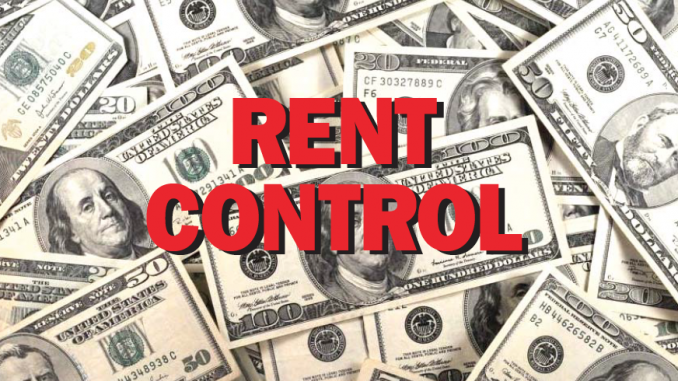
BY ALLISON LEVITSKY
Daily Post Staff Writer
A landlord-funded campaign that would effectively end Mountain View’s two-year-old rent control program didn’t qualify for the November ballot, but supporters said yesterday (Aug. 22) they’re still fighting to get on the ballot in 2020.
The Measure V Too Costly campaign has until mid-October to collect 5,126 valid signatures after it failed to meet that number in time for the Nov. 6 ballot.
If the campaign can meet that number before the October deadline, it can use the signatures that paid signature gatherers and volunteers have collected since filing the initiative on March 30.
Joshua Howard, senior vice president of the California Apartment Association — a major funder of the campaign — declined to say how many signatures have been collected so far, but he said that more than the minimum number would be submitted by the deadline.
“We find voters are eager to sign the petition once they understand this measure protects all apartment renters against price gouging, discourages rental units from being converted to million-dollar condos, eliminates endless red tape and bureaucracy so needed improvements can be made to the city’s rental housing and ensures lower-income seniors, veterans and teachers have access to rent control,” Howard told the Post in an email.
But in April, Mountain View Mayor Lenny Siegel helped put a pin in the initiative by pointing out that the fine print suspends rent control any time the city’s vacancy rate goes above 3%.
Siegel called the initiative a “sneaky repeal” because vacancy rates across all rental housing in Mountain View never dip below 3%. Since 2009, vacancy rates have hovered between 3.9% in 2011 and 5.8% in 2016.
Other parts of the initiative were designed to attract votes, Siegel said. It would limit rental protections to families earning less than the median household income and would ensure that the $2.6 million organization that runs the rent control program doesn’t access general funds without City Council approval.
In fact, the Rental Housing Committee is financed entirely by rental units. Landlords are charged $155 per year and committee members aren’t paid a salary.
The Measure V Too Costly campaign’s political consultant, Laura Teutschel, said in April that that assessment was Siegel’s “opinion” and asked if he has “a crystal ball about vacancy rates.” Teutschel didn’t return multiple requests for comment yesterday.
Steve Chandler, an advocate with the Mountain View Tenants Coalition, said he has turned in about 300 signature withdrawal forms for residents who didn’t know that the initiative would suspend rent control when they signed the petition.
Chandler said the Measure V Too Costly campaign seemed to slow down after Aug. 1, but has ramped back up with signature gathering in recent weeks. He said the other side’s signature gatherers ask people whether they rent or own and adjust their pitches accordingly.
“We spread the truth all around,” Chandler told the Post. “They use deception as their primary form of communication.”
Chandler is planning a rally at Rengstorff Park at noon on Sunday with the tenants coalition and the Silicon Valley chapter of the Democratic Socialists of America, where activists will inform “those who have been misled by paid signature gatherers” on how to withdraw their signatures.
Activists will also be urging voters to repeal the Costa-Hawkins Rental Housing Act by voting yes on Proposition 10. Since 1995, Costa-Hawkins has prevented local authorities from introducing rent control over single-family homes and condos as well as newly constructed apartments.
Chandler said tenant advocates were also working on a mailer to inform people about the intent of the Measure V Too Costly campaign.




The trouble with rent control is that it doesn’t force owners to offer their properties “to let” at the allowed rent, let alone build more housing. On the contrary, it discourages both. Defenders say you can exempt NEW buildings in order to encourage construction. But that still doesn’t open up EXISTING buildings. Worse, it means that the stock of rent-controlled becomes a shrinking fraction of the whole — unless the exemption is only for a limited time, in which case you’re discouraging construction again!
Better idea: Put a punitive tax on vacant lots and unoccupied housing, so that the owners can’t afford NOT to build housing and seek tenants! By reducing the owners’ ability to tolerate vacancies, a vacancy tax strengthens the bargaining position of tenants and therefore reduces rents.
Such a tax, by reducing the cost of housing, would make it easier for employers to pay workers enough to live on. A similar tax on commercial property would reduce rents for job-creating enterprises. That’s GOOD FOR BUSINESS and GOOD FOR WORKERS.
A vacancy tax is also GOOD FOR REALTORS because they get more rental-management fees for properties coming onto the rental market, plus commissions from any owners who decided to sell vacant properties to owner-occupants (who of course don’t pay the tax).
Best of all, the need to avoid the vacancy tax would initiate economic activity, which would expand the bases of other taxes, allowing their rates to be reduced, so that the rest of the city/state/country gets a tax cut!
So you’re going to FORCE people to rent out property when they don’t want to.
Yeah, that one will pass scrutiny by the courts.